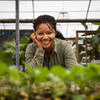Strong roots
Sistah Seeds began to blossom while Mitchell was still a horticulture student at Tyler School of Art and Architecture. During her time there, her future company was Mitchell’s main preoccupation: She developed her business plan as a student and researched some of the processes in farming for seed production.
She also spent time working at two local farms: True Love Seeds and Greensgrow Farms. At Greensgrow, she’s particularly proud of a seed library she started.
“It works very much like a book library in that anybody can come and check the seeds out,” she explained. “And the hope is that people will begin to learn how to save their own seeds, and maybe next year they can come back and return some of the seeds that they saved to the library.”
Changing seasons
Simply put, seed-keeping is part of Mitchell’s life’s mission: With Sistah Seeds, she hopes to both reduce our dependence on large corporations for seeds and to preserve Black and brown networks of seed distribution.
“It’s important to decrease dependence on the corporate seed industry because it’s harmful for agricultural biodiversity,” said Mitchell. “The diversity of agricultural crops that are grown has greatly decreased as the size of the corporate seed industry increases, and that’s a problem that can only be solved by people saving their own seeds.”



